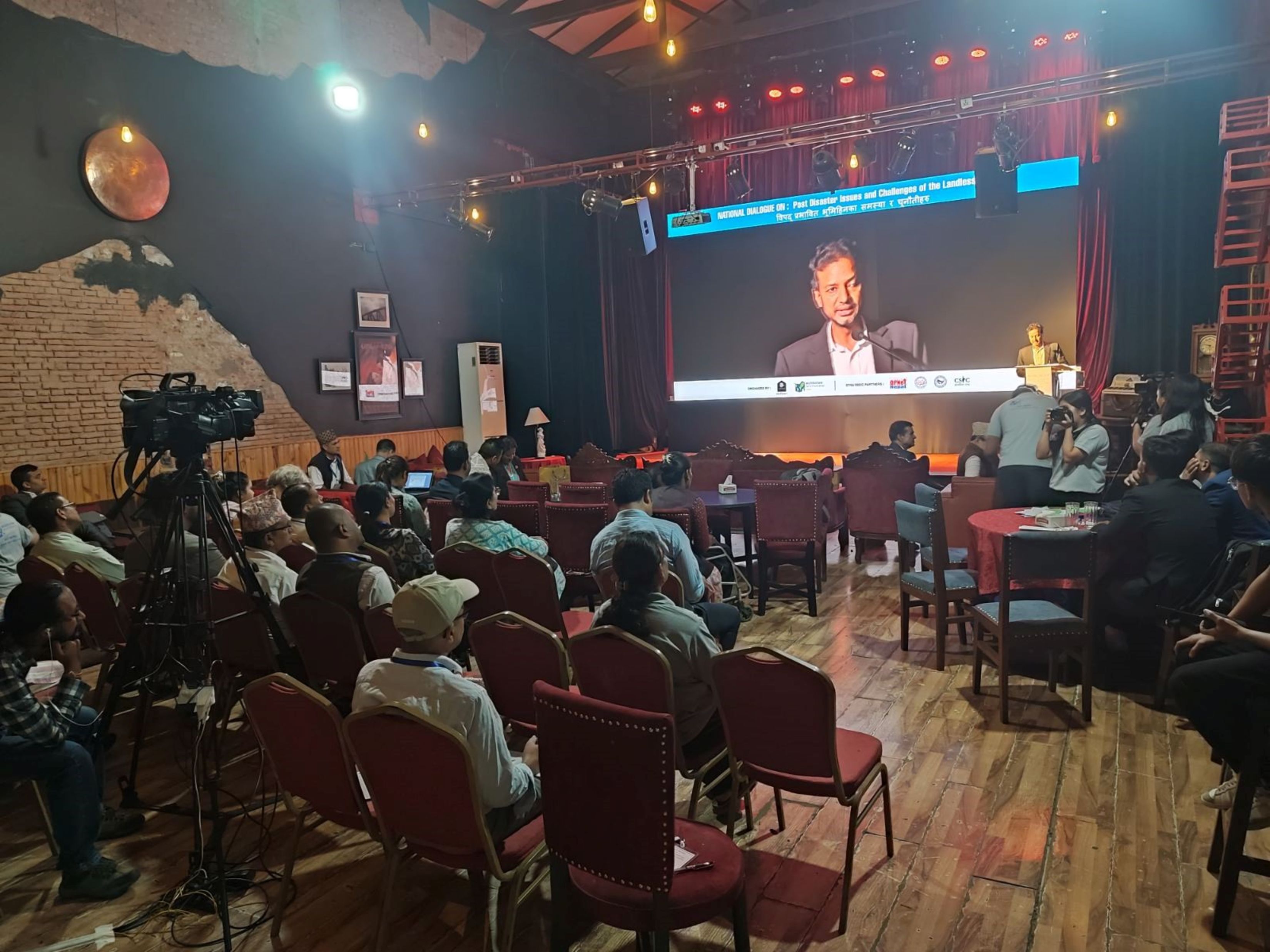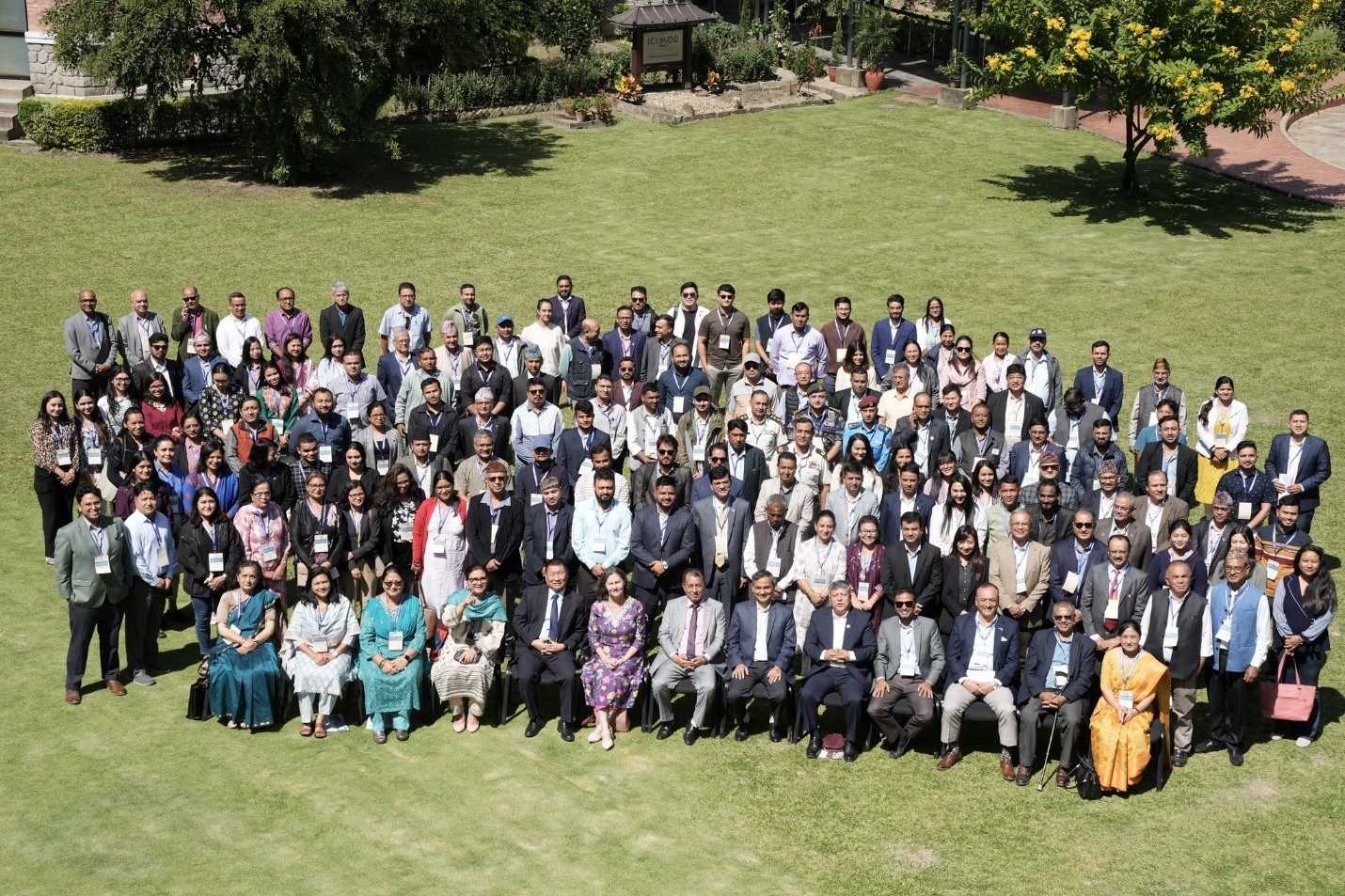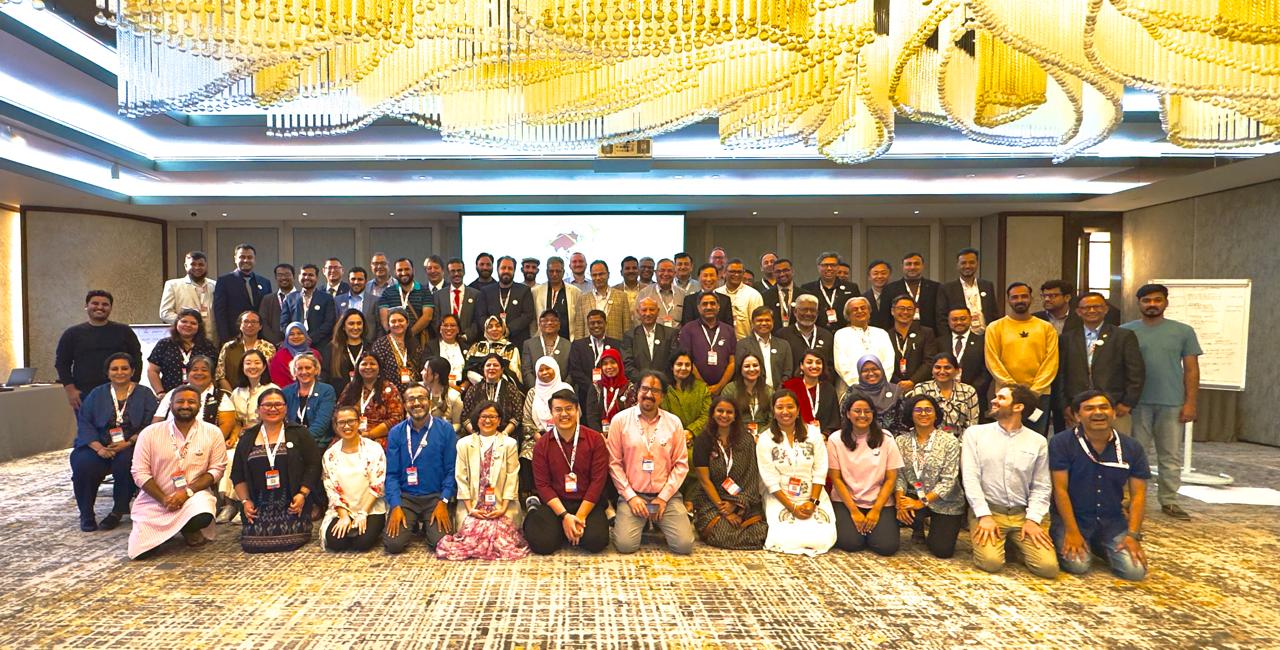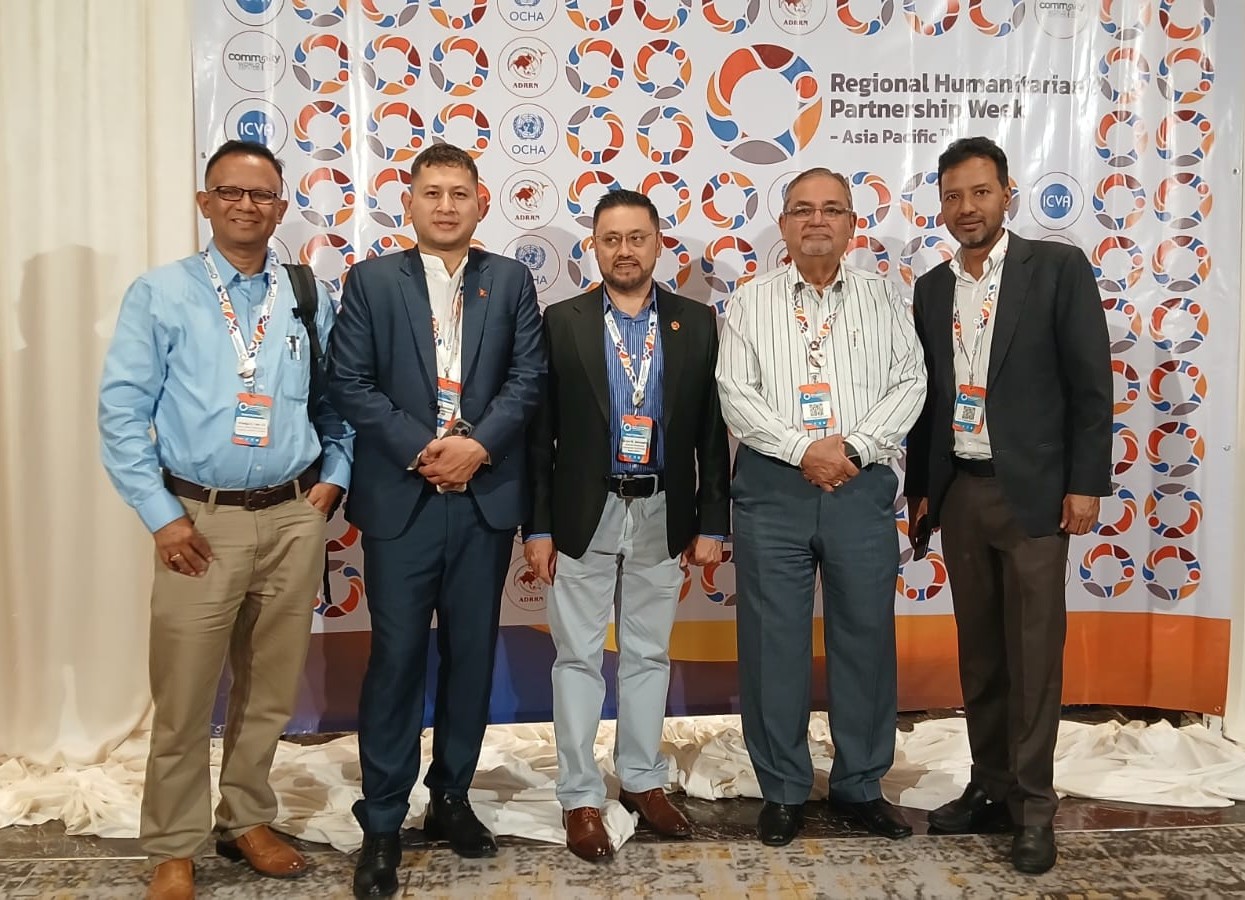National Dialogue on Post-Disaster Issues and Challenges of Landless People

On 30th September 2024, National Dialogue was held at Moksha, Jhamsikhel, Lalitpur, on Post-Disaster Issues and Challenges of Landless People organized by ASF Nepal and Foundation Abbe Pierre in collaboration with DPNet Nepal, CSRC, N-CDMC, and DiMaNN. This program was conducted in a hybrid format. The event was chaired by Dr. Raju Thapa, DPNet Chairperson, and Chair of the Cooperative and Natural Resources Committee, Federal Parliament House of Representative Honorable Kusum Thapa Magar as a chief guest of a program. The program was attended by diverse stakeholders and was honored by the presence of officials from the government such as Mr. Loknath Bastola, Under Secretary at the National Human Rights Commission, Ms. Surya Maya Danuwar, Deputy Mayor at Panchkhal Municipality along with DRR experts, representatives from various organizations like NGO, INGOs, Academia, Networks and Media. The program began with the National Anthem.
The program was facilitated by Keshav Bhatta, Treasurer of DPNet Nepal who focused on addressing important issues related to land ownership and disaster resilience.
Mr. Surya Bahadur Thapa, Chairperson of DiMaNN and IPP of DPNet Nepal addressed the gathering by stating that due to the recent heavy rainfall, which caused floods and landslides, there was consideration to postpone the program. However, it became evident that such disasters further highlighted the urgent need to focus on landlessness, making the issue even more pressing. Only relevant stakeholders involved in addressing homelessness and landlessness were invited, including Members of Parliament, government representatives, INGOs, and NGOs, to ensure that today's discussions could be incorporated into future plans and policies. He mentioned that despite forecasts and warnings prior to the rainfall, the disaster still resulted in significant damage, revealing a lack of seriousness, preparedness, and practice in addressing such issues. The authorities who should have been aware and proactive in this context remained largely uninformed and lacked consciousness. Mr. Thapa urged the MPs to bring this matter to the attention of their committees to ensure it gains the focus and attention it deserves.
Ms. Salena Sangachhe, Program Coordinator, ASF Nepal, presented the event's objectives, which included understanding the impact of natural disasters on land ownership and property rights, identifying challenges in securing land ownership post-disaster, exploring innovative solutions and best practices to address these challenges, and promoting collaboration among key stakeholders such as government agencies, NGOs, community leaders, and affected populations. Ms. Sangachhe addressed that the event aimed to create a platform for dialogue and encourage shared solutions to the complex challenges posed by disasters on land ownership.
Session 1: Understanding the Present Context/Situation of the Landless Post-Disaster
Dr. Jagat Basnet from CSRC led a session discussing the socio-economic conditions and challenges faced by landless individuals across various regions, including the hills, plains (Terai), and both eastern and western parts of Nepal. The districts of Jajarkot and Dhangadhi were highlighted for their significant landlessness issues. Landless individuals were defined as those living on others' land, unable to invest, working as laborers, feeling insecure, and facing discrimination from their communities. The discussion also extended to those who own land but lack ownership documents, restricting their access to disaster-related grants. Field experiences from Jajarkot showed that Dalit communities face dire living conditions, with many lacking secure shelter. Providing an example, he emphasized that out of 29 families living along the riverbank, 17 are completely landless. Some families received compensation for land taken by hydro projects, but those whose land is flood-prone were left uncompensated. According to municipal data, approximately 3,700 individuals in Jajarkot are categorized as landless. In Dhangadhi, a Dalit community located in low-lying areas faces yearly flooding, forcing them to relocate for up to two months. Dr. Basnet expressed major challenges in these areas include the lack of safe electricity and drinking water, poor collaboration from local government, and the absence of employment opportunities.
Discussion for the first session:
- Mr. Bhoj Raj Shrestha, Chairperson, Independent Living Center: Suggested providing jobs and housing for the landless and emphasized the need to include disabled people in discussions.
- Mr. Loknath Bastota, Under Secretary, National Human Right Commission: Avocated for ensuring social security for vulnerable populations, even if they relocate to areas outside their original place of citizenship.
- Ms. Bhuwonshwori Parajuli, Vice President, Society of Nepalese Architects: Recommended empowering women in decision-making related to land issues.
Session 2: Legal Practices/Policies/Guidelines to Address Landlessness Post-Disaster
The first presentation from session 2 was carried out by Mr. Ganesh Bhatta, Joint Secretary, Ministry of land Management Cooperatives and Poverty Alleviation for joint collaboration. He focused on the historical causes of landlessness, including natural disasters, social discrimination, and ineffective policy implementation. He outlined several definitions of landlessness, such as absolute landlessness, where individuals have no land at all; functional landlessness, where there is no legal ownership; and tenant landlessness, where tenants lack ownership rights. Although the Constitution mandates the elimination of landlessness and guarantees housing rights, these provisions are not being effectively implemented due to poor collaboration among government entities. Additionally, there are no specific policies or legal provisions addressing post-disaster landlessness, and the Ministry of Land has been notably absent from national climate change adaptation programs.
Discussion for the Second session:
- Dr. Basanta Raj Adhikari, Director, Tribhuwan University, inquired about the government's measures to address shifting river channels causing increased landlessness.
- Mr. Prabesh Bhattarai, President, Youth for Good Nepal: Emphasized the need for awareness and action on climate change among youth. He also stressed the context that as mostly the youth are not in leadership positions and generally are working in voluntarily supporting roles.
- Ms. Pratigya Neupane, Program Coordinator, NARMIN: Highlighted the need for improved coordination among stakeholders.
The Second presentation from session 2 was carried out by Advocate Mr. Bishnu Prasad Timilsina, General Secretary, DiMaNN and Forum for Protection of Consumer Right Nepal. Mr. Timilsina presented on the Gaps and lacking in the policies and prevalent legal issues of the landless post disaster. Mr. Timilsina emphasized the importance of understanding how victims feel during crises, stating that their emotional response plays a vital role in overcoming disaster situations. He highlighted the challenges faced by landless and marginalized communities in accessing basic needs—such as food, shelter, and clothing—when disasters strike. Mr. Timilsina pointed out that although the laws of Nepal guarantee the right to shelter and access to land, these provisions are not being adequately enforced. He called for immediate follow-up and monitoring of government actions to ensure that resources and rehabilitation support reach those in need. Citing the recent devastation caused by landslides, Mr. Timilsina argued that marginalized communities, particularly the landless, should receive priority in receiving shelter and rehabilitation. He stressed the need for hazard mapping, preparedness, and government support to ensure that affected populations are relocated to safe areas and provided with the means to rebuild their homes. Mr. Timilsina concluded by reiterating that without the involvement of the central government, efforts by other entities to provide shelter and support would be insufficient. This presentation highlights ongoing concerns about disaster preparedness and shelter access in Nepal, particularly for vulnerable groups, and calls for stronger governmental action to address these issues.
Session 3: Exploring Solutions and Best Practices
Mr. Minar Thapa Magar, National Coordinator of Sindh Housing Recovery and Reconstruction Platform (SHRRP) presented lessons learned from Pakistan's severe flooding in 2022, which devastated large areas and displaced millions of people. He emphasized the importance of conducting detailed demographic assessments and leveraging technology in recovery processes. The Goth Abad Act was highlighted as a legal framework that provides land allocation to the landless, offering a model for addressing such issues. A case study of Lakho Village was presented to illustrate the challenges of ensuring equal land distribution in post-disaster scenarios. Proposed solutions included implementing community-led approaches supported by technology and developing a settlement improvement plan that utilizes technological advancements to enhance recovery and resilience efforts.
Session 4: Conclusion and Way Forward
Mr. Kedar Neupane, Former Secretary of the Nepal Government and DPNet Nepal Advisor, presented the conclusion and way forward of the overall dialogue. highlighted that despite comprehensive constitutional provisions, the lack of effective implementation continues to hinder disaster response and recovery efforts for the landless population. Areas such as Jajarkot and Rukum were mentioned as lacking evacuation or recovery centers, which worsens the situation for landless and impoverished communities. He emphasized the need for coordinated efforts among various organizations working to address landlessness, though the outcomes so far have been limited. Key recommendations included establishing effective land use planning to resolve land distribution challenges and fostering collaboration among government entities to address land disputes and poverty, which are often exacerbated by disasters.
Remarks by Chief Guest Honorable MP Kusum Thapa Magar
She thanked all the organizers for arranging such an important event and highlighted that the presentations effectively reflected the objectives of the dialogue. She pointed out that hundreds of people lose their lives each year due to various forms of disasters. She acknowledged the need to revisit the acts and policies related to DRR and landlessness and stressed the importance of timely evaluation and monitoring. She emphasized the need for coordination and collaboration among the three tiers of government to address the issues and challenges related to post-disaster landlessness. Additionally, she also showed her commitment to discussing these issues on local, provincial, and federal levels of the Cooperative and Natural Resources Committee.
Mr. Pawan K. Shrestha, Director of ASF presented the Momento to the presenters, Chief guest and Chair of the event.
Closing Remarks by event Chair Dr. Raju Thapa
Dr. Thapa emphasized that land and landless issues are rarely discussed, despite the formation of various institutional structures and committees. To address this gap, DPNet Nepal has been making efforts. Five years ago, in the presence of Honorable Minister Padma Aryal, DPNet organized a discussion on a Risk-Sensitive Land Use Plan. Dr. Thapa also pointed out the absence of land-related issues diaster assessment guideline, 2013 specailly for IRA and MIRA He highlighted the ongoing challenge of amending the Disaster Assessment Guidelines to include post-disaster landless issues, emphasizing that this should be a priority. According to him, it seems that many rights exist only in documentation. Dr. Thapa further recalled the context of the Jajarkot earthquake and the situation during the civil war due to the land related certification issued by the the parellel government. He mentioned the case of Surkhet, where flood-affected areas highlight the struggles of landless and citizenship-less individuals. The issues related to landlessness and the difficulties in providing support by the development partners were also emphasized in his remarks. He urged all stakeholders to take action and continuously advocate for these issues at their respective levels. Lastly, he expressed his appreciation for the hard work behind organizing the National Dialogue, especially recognizing ASF and the overall organizing team.











